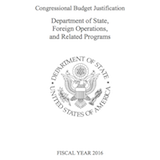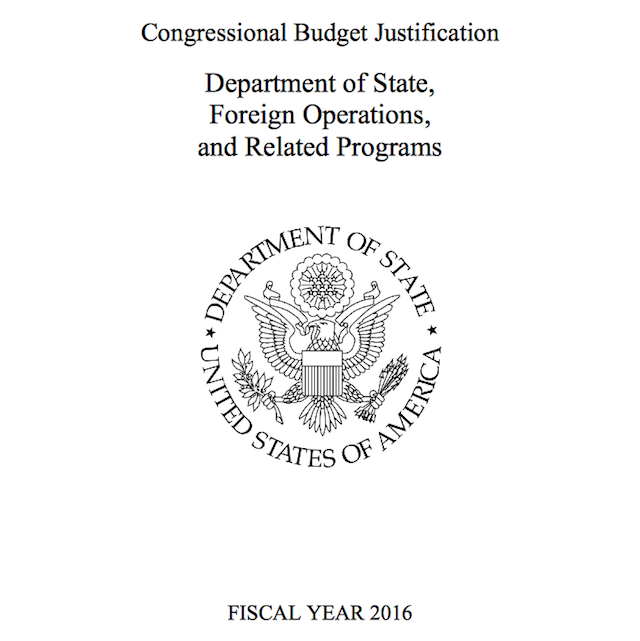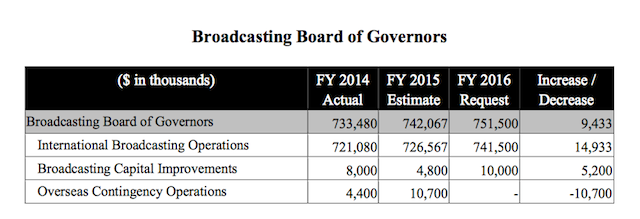BBG Watch
Obama Administration FY 2016 budget document for the Broadcasting Board of Governors (BBG) talks about “supporting current foreign policy priorities.”
Such language from the Obama White House and the State Department is not likely to please some senior Voice of America (VOA) English newsroom correspondents who had strongly objected to somewhat similar wording included in the proposed 2014 bipartisan Royce-Engel H.R. 4490 bill to reform the BBG. The bill was passed unanimously by the House of Representatives but died in the U.S. Senate. SEE: “Op-Ed Back off, Congress, and keep Voice of America real” by Al Pessin, The Los Angeles Times, June 2, 2014. Other VOA journalists, particularly those working in foreign language services, were supportive of the bill and its proposed management reforms.
FY 2016 State Department Budget Request includes the following justification (see below) for the FY 2016 budget request for the Broadcasting Board of Governors. FY 2016 Budget Request for the BBG is on page 57 of the State Department document.
The Administration’s FY 2016 budget request for BBG of $751 million represents a $9.4 million increase over the FY 2015 budget estimate of $742 million. The actual FY 2014 BBG budget was $733 million.
The Obama Administration seems to be determined to de-federalize the Office of Cuba Broadcasting (OCB), currently a federal entity within the Broadcasting Board of Governors composed of Radio and TV Marti.
The following sentence is found at the end of the State Department’s FY 2016 budget justification document section dealing with the BBG, although it does not specifically mention the OCB or Radio and TV Marti.
“Finally, the FY 2016 request proposes the authority for BBG to establish and supervise grants to an independent grantee organization to carry out media activities to Haiti and the Latin American region.”
Another section of the Obama Administration document talks about “supporting current foreign policy priorities [Emphasis added.], such as countering propaganda from Russia and the violent extremism of the ISIL.” It also refers to “BBG’s evolution away from shortwave radio transmissions [Emphasis added], and invests substantial new funding in expanding television, digital video, mobile and social platforms, and growing our global FM radio network [Emphasis added.].
“The FY 2016 request includes reductions and investments that rebalance BBG resources towards more aggressive use of television and digital media platforms. The BBG’s budget focuses on supporting current foreign policy priorities, such as countering propaganda from Russia and the violent extremism of the ISIL. The requested funding will continue BBG’s evolution away from shortwave radio transmissions, and invests substantial new funding in expanding television, digital video, mobile and social platforms, and growing our global FM radio network.”
The document also talks about the BBG establishing “new strategic performance measurements to further evolve away from outputs to outcomes and impacts with key strategic audiences.”
The total BBG FY 2016 request of $751.5 provides $741.5 million for International Broadcasting Operations and $10.0 million for Broadcasting Capital Improvements (BCI). Through the IBO funds, the Broadcasting Board of Governors (BBG) funds operations of its broadcasting organizations, as well as related program delivery and support activities. The $10.0 million in BCI funding will maintain the worldwide transmission network of the BBG, including the security requirements of facilities, maintenance, repairs, and improvements to existing systems.
The BBG is an independent Federal agency responsible for all U.S. non-military international media programs. BBG media networks include two Federal entities, the Voice of America (VOA) and the Office of Cuba Broadcasting (OCB) – Radio and TV Marti. BBG networks also include three grantee organizations Radio Free Europe/Radio Liberty (RFE/RL), Radio Free Asia (RFA), and the Middle East Broadcasting Networks (MBN) – Radio Sawa and Alhurra Television.
The BBG mission is to inform, engage, and connect people around the world in support of freedom and democracy. BBG radio, television, Internet, and mobile programs reach more than 215 million people each week in 61 languages. By delivering accurate and timely news and information, the BBG is a leading channel for information about the United States, our people, society, government and policies. We create access to news and information and support freedom of expression to foster the development of democratic values in transitioning and closed societies. Nurturing democratic values and countering misinformation that threatens peace, stability and freedom is a national security imperative, consistent with the President’s National Security Strategy.
The FY 2016 request includes reductions and investments that rebalance BBG resources towards more aggressive use of television and digital media platforms. The BBG’s budget focuses on supporting current foreign policy priorities, such as countering propaganda from Russia and the violent extremism of the ISIL. The requested funding will continue BBG’s evolution away from shortwave radio transmissions, and invests substantial new funding in expanding television, digital video, mobile and social platforms, and growing our global FM radio network.
The BBG will continue to harmonize multiple language services in strategic markets, increasing efficiency and boosting impact, by ensuring coordinated complementary operations and content where two BBG broadcasters co-exist. It has also established new strategic performance measurements to further evolve away from outputs to outcomes and impacts with key strategic audiences.
Finally, the FY 2016 request proposes the authority for BBG to establish and supervise grants to an independent grantee organization to carry out media activities to Haiti and the Latin American region.


